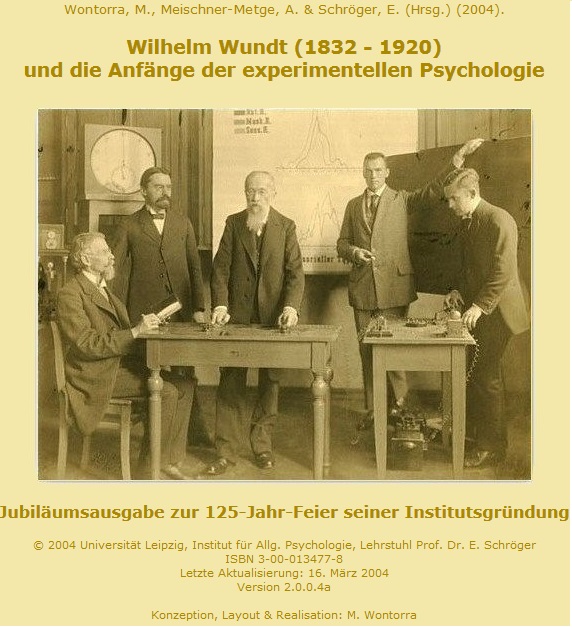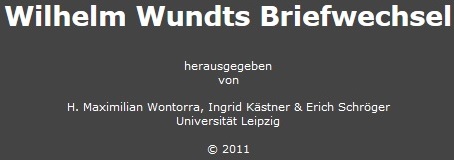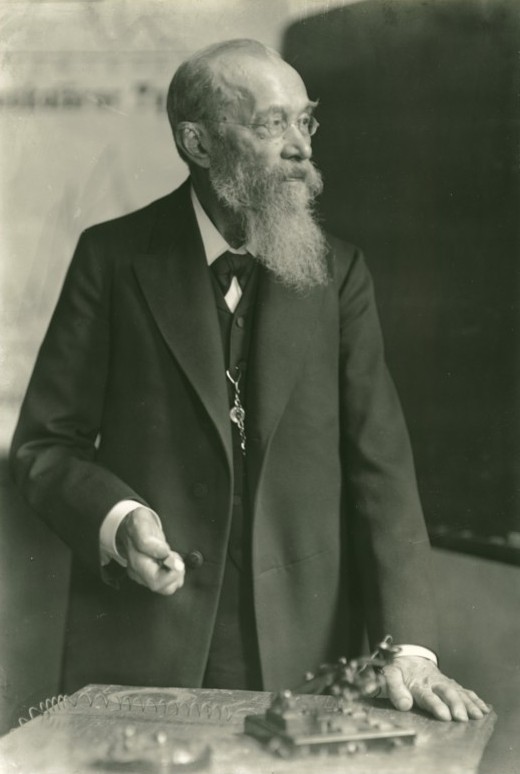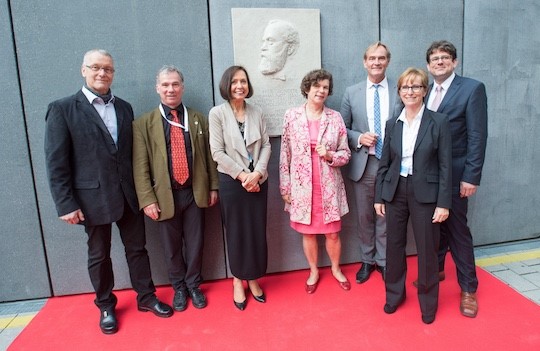On this page we give a short introduction in the history of Experimental Psychology in Leipzig starting from the foundation of the world's first Institute for Experimental Psychology and give information on the digitization of the Wundt estate.
Wilhelm Maximilian Wundt (1832–1920) founded the worlds first Institute for Experimental Psychology in Leipzig in 1879. People from all over the world came to hear Wundt’s lectures (which started in Leipzig 1875) and workshops and to observe research executed in the laboratory. Leipzig had become a Mecca for modern psychology. In 1917, Wundt abdicated from his professorship and he had written 184 expert reports for doctoral candidates. At least 60 candidates had been from foreign countries and 18 from the United States. Fechner’s psychophysics and measurements of reaction times had been prominent in experimental studies in Wundt's lab (the main focus of 85 dissertations).
Many of the student and scientists who assisted in Wundt’s research became famous scientists on their own, such as James McKeen Cattell (1860–1944), Emil Kraepelin (1856–1926), G. Stanley Hall (1844–1924), Friedrich Kiesow (1858–1940), August Kirschmann (1860–1932), James Mark Baldwin (1861–1934), Oswald Külpe (1862–1915), Ernst Meumann (1862–1915), Charles Spearman (1863–1945), Hugo Münsterberg (1863–1916), Edward B. Titchener (1867–1927), John M. McEachran (1878–1971), Wilhelm Wirth (1876–1952), Cai Yuanpei (1868–1940).

Anfänge der experimentellen Psychologie
We compiled two CDs, one devoted to his work (e.g., books, experimental devices), the other to his letters (e,g, Fechner, Stratton). This CD contains many original texts (books including tables and figures, papers, letters) from Wilhelm Maximilian Wundt (1832–1920) . The book “Grundzüge der Psychologie” is included in English as well “Outlines of Psychology” (translated by Charles Hubbard Judd and Wilhelm Wundt in 1907). It also contains selected books being important for the foundation of Experimental Psychology from E. H. Weber, G. Th. Fechner, R. H. Lotze, H. v. Helmholtz, E. Mach and H. Ebbinghaus, and the complete doctoral theses from M. Friedrich, J. McKeen Cattell, and Ch. Spearman. We scanned those old documents and converted them to real text enabling search within and across the documents.
Furthermore, descriptions of many experimental devices used at those times including photos/illustrations of the apparatus and various other stuff such as plenty of pictures of the early experimental psychologists are included. Moreover, the CD also contains parts of the doctoral thesis by David K. Robinson about Wundt (written in English).
Although the electronic version of the texts (including 30 complete books) were carefully proofread, not all typos could be avoided. Please note that this CD is the result of hard work of many people, most of all Maximilian Wontorra and Dr. Anneros Meischner-Metge, but also H.-J. Drogott, K. Drews, G. Flau, R. Glinka, R. Jentsch, W. Zumpe and various coworkers of the Institute for General Psychology of the University of Leipzig. This CD also profited from the help of Prof. Dr. H. Gundlach, Prof. Dr. H.-J. Lander, Prof. Dr. D. K. Robinson, and Prof. Dr. W. Woodward. Please, refer to it as Wontorra, M., Meischner-Metge, A., & Schröger, E. (Eds.). (2004). Wilhelm Wundt (1832–1920) und die Anfänge der Experimentellen Psychologie [Wilhelm Wundt (1832–1920) and the rise of Experimental Psychology]. (CD [ISBN 3-00-013477-8]).

Wilhelm Wundts Briefwechsel
This CD contains letter exchanges between Wundt and other famous scientists, for example Hermann von Helmholtz, Gustav Theodor Fechner, Emil Kraepelin, James McKeen Cattell, Wilhelm Ostwald, Théodule Armand Ribot and Hugo Münsterberg. This CD has been compiled by Dr. Maximilian Wontorra, as part of a DFG-grant to Erich Schröger and Ingrid Kästner. Please, refer to it as Wontorra, M., Kästner, I., & Schröger, E. (2011). Wilhelm M. Wundts Briefwechsel [Letters to and from Wilhelm M. Wundt]. Institut für Psychologie der Universität Leipzig. For the results of a successor project (Erschließung und Digitalisierung des Nachlasses von Wilhelm Wundt) see https://sammlungen.uni-leipzig.de/wundt or https://sammlungen-editor.uni-leipzig.de/search_form_wundt_simple.xed
The Wundt-memorial was revelated at September 19th 2016 at the German Psychological Society Congress hosting close to 3000 participants (please, note that Wundt is facing towards the current Psychology building, the "Städtisches Kaufhaus"). The memorial, made by Markus Gläser based on an idea by Prof. Dr. Robert Roe (1944–2016), is located in between the University lecture hall building and the Institute of Psychology; from left-to-right: Markus Gläser, Prof. Erich Schröger (then Dean of the Faculty of Biosiences, Pharmacy, and Psychology); Prof. Wintermantel (President of the German Academic Exchange Service), Prof. Schücking (Rector of Leipzig University), Burkhard Jung (Major of the City of Leipzig), Prof. Abele-Brehm (then President of the German Psychological Society), Prof. Fritsche (then President of the German Psychological Society Congress). The memorial was financed with donations from Professor of Psychology Sharlene D. Walbaum and her students (Quinnipiac University, USA), students and professors of the Leipzig Institute of Psychology, the German Psychological Society, and the Association of sponsors and friends of Leipzig University.
Further reading
For further texts of our group about Leipzig's history of Psychology, see:
- Meischner-Metge, A. & Schröger, E. (2019). Leipzig – Die Geschichte des Instituts für Psychologie der Universität Leipzig. In: A. Stock & W. Schneider (Hrsg.) Die ersten Institute für Psychologie im deutschsprachigen Raum: Ihre Geschichte von der Entstehung bis zur Gegenwart. Göttingen: Hogrefe.
- Schröger, E. (2019). Wundt, Wilhelm Maximilian. In Institut für Sächsische Geschichte und Volkskunde e.V. (Ed.), Sächsische Biografie.
- Meyer, T., Mädebach, A., & Schröger, E. (2017). The digitization of the Wundt estate at Leipzig University. Hist Psychol, 20(3), 342–345.
- Meyer, T., Mädebach, A., & Schröger, E. (2016). Das Leipziger Projekt zur Erschließung und Digitalisierung des Nachlasses von Wilhelm Maximilian Wundt. Psychologische Rundschau, 67(3), 208–211.
- Wontorra, H. M. (2013). Early Apparatus-Based Experimental Psychology, primarily at Wilhelm Wundt's Leipzig Institute. In C. Pléh, L. Gurova & L. Ropolyi (Eds.), New Perspectives on the History of Cognitive Science (pp. 59-80). Budapest: Akadémiai Kiadó
- Schröger, E. (2012). Cognitive Psycho(Physio)Logy, Consciousness, and Some Historical Facts. American Journal of Psychology, 125(2), 250–255.
- Wontorra, H. M. (2011). Stellungnahme zu Gerd Jüttemanns Historischer Psychologie. Erwägen Wissen Ethik, 22(1), 115–116.
- Wontorra, H. M. (2010). Apparategestützte experimentelle Psychologie an Wundts Institut. In: K. Reschke, U. Kranich & W. Schubert (Hrsg.), Mensch im Verkehr. Mobilität – Sicherheit – Lebens-qualität. Tagungsband Sommeruniversität Verkehrspsychologie am 25. – 26. September 2009 in Leipzig. (S. 16–23). Bonn: Kirschbaum.
- Wontorra, M. (2009). Wundts Psychologie einer überindividuell-kulturellen Entwicklung. Psychotherapie & Sozialwissenschaft, 1, 89–101.
- Wontorra, H. M. (2009). Frühe apparative Psychologie. Tönning: Der Andere Verlag.
- Wontorra, M. (2009). Wilhelm Wundts europäische Kontakte im Spiegel seiner Korrespondenz. In I. Kästner (Ed.), Wissenschaftskommunikation in Europa im 18. und 19. Jahrhundert. Beiträge der Tagung vom 5. und 6. Dezember 2008 an der Akademie gemeinnütziger Wissenschaften zu Erfurt (pp. 147–160).
- Schröger, E., & Rauschecker, J. (2006). Wundt, Wilhelm. In K. Brown (Ed.), Encyclopaedia of Language & Linguistics (2 ed., pp. 688–689). Amsterdam: Elsevier.
- Wontorra, H. M., & Schröger, E. (2005). Reaktionsversuche an Wundts Leipziger Institut. In K. U. Ettrich (Ed.), 125 Jahre Psychologie an der Universität Leipzig (pp. 21–34). Leipziger Universitätsverlag: Leipziger Universitätsverlag.

